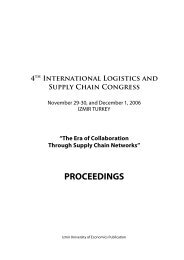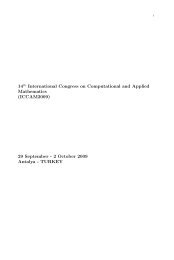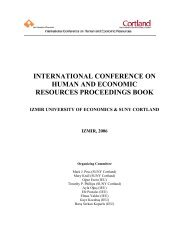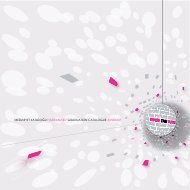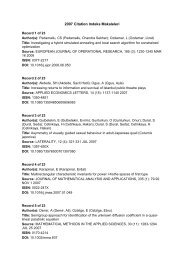- Page 1 and 2: E n D ® 11-13 İL SDDV DAİ ITH DI
- Page 3 and 4: ACKNOWLEDGEMENTS We are grateful to
- Page 5 and 6: INDEX Introduction 12 Keynote Speak
- Page 7 and 8: Signs of discourse: Site markers as
- Page 9 and 10: Theme: Disaster Design against disa
- Page 11 and 12: Design discourse involves the curre
- Page 13: CliveDILNOT 'Dancing with Disorder:
- Page 16 and 17: season (first aired on April 3, 200
- Page 18 and 19: they are able to represent their we
- Page 20 and 21: Leatherbarrow and Mostafavi (2002,
- Page 22 and 23: 1."a mechanism for introducing vari
- Page 24 and 25: is a "hiatus:""tinere is no common
- Page 26 and 27: G D M P U T E R A I D E D D E S I G
- Page 28 and 29: jewellery exports, -by order of exp
- Page 30 and 31: doesn't draw by lines as in other p
- Page 32 and 33: collaborate İn this work. In some
- Page 34 and 35: F R O M C H A D S TD C L A R I T Y
- Page 36 and 37: Tolerating ambiguity Design activit
- Page 38 and 39: oversimplifies Schon's theory.This
- Page 42 and 43: are structured and rendered objecti
- Page 44 and 45: LAWSON, B., 2004.'Schemata, gambits
- Page 46 and 47: terms, organized alpliabetically an
- Page 48 and 49: Stock posters Theater posters UseTe
- Page 50 and 51: classification. However, he conside
- Page 52 and 53: 2.2. Poster design (genera! topic r
- Page 54 and 55: 5. Observations (complementary topi
- Page 56 and 57: D E V E L O P I N G T H E B R A N D
- Page 58 and 59: form strategic alliances. Born Glob
- Page 60 and 61: They are responsible for (1) Marl
- Page 62 and 63: Stores in the USA and "the Lucl
- Page 64 and 65: Fromthatpoint,GayGÇevikelworkswith
- Page 66 and 67: References AKGÜN, M., 2006. Tasar
- Page 68 and 69: Neurath believed to have discovered
- Page 70 and 71: MACHTE DER ERDE mmm wffilliiflpl^ F
- Page 72 and 73: always represented by a man^^ The s
- Page 74 and 75: HORTON,W.,1994.The Icon Book: Visua
- Page 76 and 77: encountered in; That approaches suc
- Page 78 and 79: The work of the designers who belon
- Page 80 and 81: This project showed that there was
- Page 82 and 83: So the "way things are" is the desi
- Page 84 and 85: The two case studies presented here
- Page 86 and 87: advantage, grow/th and innovation p
- Page 88 and 89: When it comes to competition in glo
- Page 90 and 91:
Mavi is an excellent example of how
- Page 92 and 93:
want to go global adopt is to build
- Page 94 and 95:
Guilien, M. F., 2001a. Is globaliza
- Page 96 and 97:
T H E g U E S T I D N O F D E S I G
- Page 98 and 99:
distributing and promoting. But it
- Page 100 and 101:
3. On the Potential ofthe Aesthetic
- Page 102 and 103:
in terms of design both in the case
- Page 104 and 105:
From statements like this itcan bei
- Page 106 and 107:
^ One of the most clear and insight
- Page 108 and 109:
C U L T U R A L D I V E R S I T Y I
- Page 110 and 111:
of importance is still going on. Th
- Page 112 and 113:
etween Dutch and Korean people on a
- Page 114 and 115:
What does it mean for product desig
- Page 116 and 117:
D A N C I N G W I T H D E S I G N -
- Page 118 and 119:
has also incredibly expanded (detai
- Page 120 and 121:
have been in operation since 2002 a
- Page 122 and 123:
Vtcdiiiili .S!7c
- Page 124 and 125:
the process of the development of d
- Page 126 and 127:
KFSB, 2006. Statistics of Small & M
- Page 128 and 129:
It Is commonplace practice in highe
- Page 130 and 131:
interpretation acceptable in assess
- Page 132 and 133:
that 'emphasise preparation for lea
- Page 134 and 135:
on the effectiveness ofthe outcomes
- Page 136 and 137:
peers against these, reflecting gre
- Page 138 and 139:
successful completion of all compon
- Page 140 and 141:
Appendix three. Example of a studen
- Page 142 and 143:
Hager, P., Holland, S. & Beckett, D
- Page 144 and 145:
involved graphic designers working
- Page 146 and 147:
During phase one of the process the
- Page 148 and 149:
The small business controls communi
- Page 150 and 151:
Interviews with the four graphic de
- Page 152 and 153:
İND, N., 1997. The Corporate Brand
- Page 154 and 155:
agor/s, commonly known astheb/Vby,
- Page 156 and 157:
This paper reports on an ethnograph
- Page 158 and 159:
dimensions were already interwoven
- Page 160 and 161:
depth, the authors have adopted two
- Page 162 and 163:
experientially; structurally; In pr
- Page 164 and 165:
Within this paper we have sought to
- Page 166 and 167:
D E S I G N I N T E N S I V E B D R
- Page 168 and 169:
dominated by tine impact of the aes
- Page 170 and 171:
innovative and unusual solutions in
- Page 172 and 173:
2) Micro level factors: Company rel
- Page 174 and 175:
from the unique characteristics of
- Page 176 and 177:
HARGADON, A., & R. I. SUTTON {1997}
- Page 178 and 179:
administrative regions), winose exe
- Page 180 and 181:
economist will have the tendancy to
- Page 182 and 183:
in philosophy, distinction should b
- Page 184 and 185:
The central figure of Christ Is div
- Page 186 and 187:
"hypothesis" becomes a "problem" or
- Page 188 and 189:
T H E B A L A N C I N G A C T D F P
- Page 190 and 191:
Products often communicate connecti
- Page 192 and 193:
elements related to the product its
- Page 194 and 195:
16 Trophies 17 Camera Refers to all
- Page 196 and 197:
References BELK, R., 1988. Possessi
- Page 198 and 199:
of these outcomes by the users thro
- Page 200 and 201:
are still employed in contemporary
- Page 202 and 203:
their utilities within paradigm set
- Page 204 and 205:
References ANDERS, R (1999) 'Envisi
- Page 206 and 207:
Review of Literature As described b
- Page 208 and 209:
Figure 2. Myosotis - Assembly proce
- Page 210 and 211:
for teenage girls may enhance the e
- Page 212 and 213:
study has adopted a holistic framew
- Page 214 and 215:
techniques of the main and suppleme
- Page 216 and 217:
'There is a relationship between im
- Page 218 and 219:
the toy themselves. Others were try
- Page 220 and 221:
DORST, K.; AND CROSS, N., 2001. Cre
- Page 222 and 223:
S E R V I C E - S C A P E A N D W H
- Page 224 and 225:
epresentations to present the compl
- Page 226 and 227:
The white space indicated consists
- Page 228 and 229:
References BiTNER, M,., J.,1992. Se
- Page 230 and 231:
the basic economic, social and cult
- Page 232 and 233:
group members to make sense of soci
- Page 234 and 235:
industrial design profession; there
- Page 236 and 237:
Last but not the least, the final i
- Page 238 and 239:
ER, H. A, KORUT, F. AND ER, Ö., 20
- Page 240 and 241:
A E S T H E T I C D F D I S O R D E
- Page 242 and 243:
new characteristics of today's worl
- Page 244 and 245:
development. They speak about 'bio-
- Page 246 and 247:
D i S G D U R S E O N T H E I N T E
- Page 248 and 249:
Cluster title PI Institution URL Pr
- Page 250 and 251:
questionnaires and received 163 rep
- Page 252 and 253:
emergent position Figure 4. Emergen
- Page 254 and 255:
References COX, G. 2005, Cox Review
- Page 256 and 257:
value of user life experience to de
- Page 258 and 259:
Using different cards at different
- Page 260 and 261:
expertise was not immediately relev
- Page 262 and 263:
I was intrigued by this project exp
- Page 264 and 265:
identifying the similanty and concl
- Page 266 and 267:
methods that can be used to bring t
- Page 268 and 269:
F L O W A N D T H E O P T I M A L E
- Page 270 and 271:
activities mediated througli the us
- Page 272 and 273:
problems is often a key focus in th
- Page 274 and 275:
the intrinsic rewards that are asso
- Page 276 and 277:
working in the controlled and secur
- Page 278 and 279:
PARKS, B. (2006), Makers: All Kinds
- Page 280 and 281:
We start by acknowledging Mary Park
- Page 282 and 283:
• Chaos and complexity theory (Me
- Page 284 and 285:
the individual competition that is
- Page 286 and 287:
the base when discussing strategy a
- Page 288 and 289:
synthetic dialectic, İn the abyss
- Page 290 and 291:
of current management thought and p
- Page 292 and 293:
end user and company - and the desi
- Page 294 and 295:
Johansson, U.andJ.Woodiiia, Eds. (2
- Page 296 and 297:
"Complex systems and simple systems
- Page 298 and 299:
inherent limits of modelling comple
- Page 300 and 301:
- consciousnesses -> the "taste gap
- Page 302 and 303:
Jonas, Wolfgang; Meyer-Veden, Jan {
- Page 304 and 305:
and concepts related to the the ide
- Page 306 and 307:
İconologİcal analysis^. In other
- Page 308 and 309:
Second, the curve in question can b
- Page 310 and 311:
is an invention of tradition in thi
- Page 312 and 313:
T H E C O N C E P T O F F U N IN P
- Page 314 and 315:
elatively higher in all age groups.
- Page 316 and 317:
Ease of Use Usefulness As one of th
- Page 318 and 319:
According totheparticipants'stateme
- Page 320 and 321:
References BLYTHE M-, HASSENZAHL M.
- Page 322 and 323:
number of preferred piay activities
- Page 324 and 325:
It is known that we encounter the w
- Page 326 and 327:
he was observed running baclcwards
- Page 328 and 329:
References AYRES, A. J., & TICKLE,
- Page 330 and 331:
SHERRATT, D. & PETER M., 2002. Deve
- Page 332 and 333:
opportunities to enhance awareness
- Page 334 and 335:
about material use in jewellery by
- Page 336 and 337:
of doing so. There are several impl
- Page 338 and 339:
References ASSOCIATION FOR CONTEMPO
- Page 340 and 341:
The ontologica! problems of radical
- Page 342 and 343:
ody which is technologically dresse
- Page 344 and 345:
Dress as a cocoon Cocooning being t
- Page 346 and 347:
Figure 18. Corsets from OlivierTlie
- Page 348 and 349:
possibiiity of organizing personal
- Page 350 and 351:
level, capable of processing inform
- Page 352 and 353:
Figure 32. Alexander Mc Queen's pnn
- Page 354 and 355:
KİPÖZ, Ş., 2003. Design Since Th
- Page 356 and 357:
Designing injection moulded plastic
- Page 358 and 359:
A wide range of material properties
- Page 360 and 361:
Preliminary experimental results Ac
- Page 362 and 363:
Manisalco M., Choosing resins in th
- Page 364 and 365:
interact with each other. The softw
- Page 366 and 367:
of the object as well as time and m
- Page 368 and 369:
Le Meur explains how an interactive
- Page 370 and 371:
References BİNKLEY,T., 2000,TheVit
- Page 372 and 373:
character becomes obvious, in the p
- Page 374 and 375:
(Busby 2001) or an information proc
- Page 376 and 377:
attribute to their various experien
- Page 378 and 379:
context—ones that are not based o
- Page 380 and 381:
MIDLER, C 1995. Organiser la creati
- Page 382 and 383:
queriesdirectiyquGstionthedesign pr
- Page 384 and 385:
Street Furniture when perceived by
- Page 386 and 387:
did not consciously notice nor repo
- Page 388 and 389:
Clearly ethical design does not ref
- Page 390 and 391:
more productive ways; 2. more flexi
- Page 392 and 393:
Formed in 2004, CriticaiCorps was e
- Page 394 and 395:
the studio itself but rather the co
- Page 396 and 397:
References BOYER, E. and MITGANG, L
- Page 398 and 399:
needs of research practice in desig
- Page 400 and 401:
3) Reviewing the meaning of knowled
- Page 402 and 403:
in orderto managetliis infinite reg
- Page 404 and 405:
skeletal arm to inform the future d
- Page 406 and 407:
HİGGS, J. and A. TİTCHEN 1995. "T
- Page 408 and 409:
consumption cycle to include cash t
- Page 410 and 411:
Other examples of signs deploying d
- Page 412 and 413:
H O W TD A D D C U L T U R A L A T
- Page 414 and 415:
3. Informedia DVL: This project is
- Page 416 and 417:
People from different cultural back
- Page 418 and 419:
References AYKiN, N. and MILEWSKI,
- Page 420 and 421:
physical level (lean construction).
- Page 422 and 423:
and Ballard's (2000) "positive/nega
- Page 424 and 425:
performed intuitively, ignoring the
- Page 426 and 427:
C U L T U R A L P R O D U C T D E S
- Page 428 and 429:
is difficult to define a museum's"s
- Page 430 and 431:
From an analogous perspective, vari
- Page 432 and 433:
the publishing graphic designer oug
- Page 434 and 435:
The graphic aesthetic value of book
- Page 436 and 437:
design allows for the determination
- Page 438 and 439:
References Arranz, J. C. (1997). Ge
- Page 440 and 441:
semantic extensions refer to ignora
- Page 442 and 443:
Emergence is what parts of a system
- Page 444 and 445:
een argued (Friedman 1999) that act
- Page 446 and 447:
D R A W I N G A N D I M A G E S D F
- Page 448 and 449:
The modernist proposal underlines t
- Page 450 and 451:
Art as an historical event, breakin
- Page 452 and 453:
The Symbol as a sign that acts., an
- Page 454 and 455:
image + idea , image {- presenatio)
- Page 456 and 457:
STRICTLY BALLRODM DR DANCING IN THE
- Page 458 and 459:
Briefing - the Peter Principles Des
- Page 460 and 461:
energy and interaction. This proces
- Page 462 and 463:
Case study findings soiution" (Terr
- Page 464 and 465:
ask quGstions...that is wlien you s
- Page 466 and 467:
References BRUCE, M. & DOCHERTY, C
- Page 468 and 469:
A definition of design has been sou
- Page 470 and 471:
We cannot disassociate these exampl
- Page 472 and 473:
The plane or that which would be th
- Page 474 and 475:
References BOZAL, Valeriano,1987. M
- Page 476 and 477:
Fast-fashion (Foroohar, 2005; Fraze
- Page 478 and 479:
Behavioral Design with Utilitarian
- Page 480 and 481:
3. Resolve product-related conflict
- Page 482 and 483:
think that's important, because I d
- Page 484 and 485:
Aqueveque, C, 2006. Extrinsic cues
- Page 486 and 487:
A F O D T W E A R D E S I G N P R D
- Page 488 and 489:
ole-play learning makes us think th
- Page 490 and 491:
exert efforts on the issue, but the
- Page 492 and 493:
Transfofming 2056 Footwear Concepts
- Page 494 and 495:
esults. Students inquired about, an
- Page 496 and 497:
D E S I G N E R ' S M E T İ S Osma
- Page 498 and 499:
Attributing a certain degree of tru
- Page 500 and 501:
of products has vanous implications
- Page 502 and 503:
However, the ethical evaluation oft
- Page 504 and 505:
References BERCHICCI, U W. BODEWES,
- Page 506 and 507:
culture began to witness a rapid de
- Page 508 and 509:
in the success ofthe design. Rodema
- Page 510 and 511:
11 which displayed geometric patter
- Page 512 and 513:
References Websites Adams, C, (2006
- Page 514 and 515:
idea is to convey and construct a m
- Page 516 and 517:
as a representational space in term
- Page 518 and 519:
• Seismology and Earthquake, K. E
- Page 520 and 521:
4. The inspiring historicai informa
- Page 522 and 523:
epresentations tlirough the effecti
- Page 524 and 525:
References BASA, i-, 2000."Linguist
- Page 526 and 527:
World and is in a good position to
- Page 528 and 529:
wellbeing. It is about going somewh
- Page 530 and 531:
Good Designer as Tourist gains a 'c
- Page 532 and 533:
artificial world. To fill in a kind
- Page 534 and 535:
References BREMNER, C, 2005. Open M
- Page 536 and 537:
Mike Press, Rachel Cooper, Nigel Cr
- Page 538 and 539:
In this part of the story, White gi
- Page 540 and 541:
Conclusion As design researchers, w
- Page 542 and 543:
D E S I G N R E D U X Stuart Walker
- Page 544 and 545:
oftheir production. In other words,
- Page 546 and 547:
purposes of illustration) but to pr
- Page 548 and 549:
As a localiy achievable, sustainabl
- Page 550 and 551:
study, researchers suggested that c
- Page 552 and 553:
D A N C I N G W I T H D I S O R D E
- Page 554 and 555:
sustains us?). As we all know, not
- Page 556 and 557:
we envisaged a unified, consensual,
- Page 558 and 559:
p reva (ânca of 'nsn-places' {cJ A
- Page 560 and 561:
References Ascott, R., (1994) in Gi
- Page 562 and 563:
closely meet these requirements thr
- Page 564 and 565:
of working with anotfier practition
- Page 566 and 567:
can temporarily paralyse his moveme
- Page 568 and 569:
Conclusion The practical l
- Page 570 and 571:
BEYOND DISASTER: ON ESTABLISHING A
- Page 572 and 573:
and types of refugees and the struc
- Page 574 and 575:
ofthe resources available have so f
- Page 576 and 577:
35 Kırlı, 38. 36 İlkay Sunar, "T
- Page 578 and 579:
6. References CA: National Center f
- Page 580 and 581:
I N T E L L I G E N T P R O D U C T
- Page 582 and 583:
"The definition of an intelligent p
- Page 584 and 585:
T-Design aims to develop patent-foc
- Page 586 and 587:
Figure 2. "T-Meter" water meter (T-
- Page 588 and 589:
The new product development process
- Page 590 and 591:
Arçelik directs its investments ac
- Page 592 and 593:
PRAHALAD, C K. and RAMASWAMY, V., 2
- Page 594 and 595:
Computer literacy Since the advent
- Page 596 and 597:
investigations...' {Garfinl
- Page 598 and 599:
its social situated-ness;and itis i
- Page 600 and 601:
non-intentionai design, 'refers to
- Page 602 and 603:
O R D E R A N D D I S O R D E R IN
- Page 604 and 605:
y Giuseppe Terragni; the UN Headqua
- Page 606 and 607:
7. Characteristics that enhance an
- Page 608 and 609:
This early typewriter had its limit
- Page 610 and 611:
This case is similar to the competi
- Page 612 and 613:
' ] 1 i i J 1 ) ! i t i •• Figu
- Page 614 and 615:
shift key also has a relation with
- Page 616 and 617:
References Basalla, G. 1988, The Ev
- Page 618 and 619:
of as the presence of phenomenon, t
- Page 620 and 621:
By running a cellular automata prog
- Page 622 and 623:
postmodernism rejects the structure
- Page 624 and 625:
a social condensor as thG"programma
- Page 626 and 627:
OBJECTS FOR PEACEFUL DISORDERING: I
- Page 628 and 629:
Figure 1. Lock-on in use at Faslane
- Page 630 and 631:
The idea that these loc[
- Page 632 and 633:
Design is much more than that which
- Page 634 and 635:
to designs that stresses their symb
- Page 636 and 637:
KİLLER PRODUCTS İN THE MARKET ECO
- Page 638 and 639:
Charles Martel, leader of the Frank
- Page 640 and 641:
to an increase in perceived product
- Page 642 and 643:
QWERTY introduces the concept of la
- Page 644 and 645:
İn addition people start to use to
- Page 646 and 647:
NETWORK EFFECT http://www.marketing
- Page 648 and 649:
efore than it did for design histor
- Page 650 and 651:
When "the umbrella period" is decid
- Page 652 and 653:
6" Advertisements of household prod
- Page 654 and 655:
T H E P A R O D Y D F T H E M D T L
- Page 656 and 657:
ofthe museum spectacle orthe depart
- Page 658 and 659:
disintegrate, to age, to cliange co
- Page 660 and 661:
unconventional approach and sometim
- Page 662 and 663:
H D W O F T E N D D Y O U W A S H Y
- Page 664 and 665:
of expression and interpretation'to
- Page 666 and 667:
DtSIGMER i ıı:.;-. VOLUNTEER DESI
- Page 668 and 669:
4 \ Figure 7. Fictional drawings s
- Page 670 and 671:
time interactions where the intervi
- Page 672 and 673:
While some designers tried to keepf
- Page 674 and 675:
NewYork based Cat Mazza choses to u
- Page 676 and 677:
alternative approaches ofdesign as
- Page 678 and 679:
The fact that industrial designers
- Page 680 and 681:
H A R N E S S I N G D I S O R D E R
- Page 682 and 683:
interpreting is required, the inter
- Page 684 and 685:
narrative skeleton, the narrative I
- Page 686 and 687:
6 By Practice as a metiiod As an ar
- Page 688 and 689:
possibİİities in terms of conclus
- Page 690 and 691:
LEİSHMAN. D„ 2004. Deviant:The P
- Page 692 and 693:
2. Different Approaches to Crime an
- Page 694 and 695:
In addition, poorly lighted areas s
- Page 696 and 697:
C I T I E S A N D T H E D E S T R U
- Page 698 and 699:
cultural identity and so on are bro
- Page 700 and 701:
developed by others such as Merleau
- Page 702 and 703:
manner in which a particular societ
- Page 704 and 705:
I N V E N T I N G D E S I G N I D I
- Page 706 and 707:
legitimacyofthemannerin which many
- Page 708 and 709:
An important rider to this argument
- Page 710 and 711:
Figure 7. Developmental cutlery In
- Page 712 and 713:
S O C I A L M O B I L E S A N D S P
- Page 714 and 715:
disseminated: a bool
- Page 716 and 717:
Working models will be builtand exp
- Page 718 and 719:
References [I] Aim, N.&Newell,A. (1
- Page 720 and 721:
Based on the theories of Eco, Metin
- Page 722 and 723:
the emotional - interaction and the
- Page 724 and 725:
model, interactivity refers to the
- Page 726 and 727:
world act under the control of Indi
- Page 728 and 729:
References AARSETH, E., 1997. Cyber
- Page 730 and 731:
Gaile (2002) points out that the ph
- Page 732 and 733:
As a result of the subjective issue
- Page 734 and 735:
aw materials may resemble natural d
- Page 736 and 737:
epresenting an ontological level th
- Page 738 and 739:
D A N C I N G WITH D I S P L A C E
- Page 740 and 741:
'Our own'people and the strangers a
- Page 742 and 743:
The various nationalities use speci
- Page 744 and 745:
S O C I A L R E S P O N S I B I L I
- Page 746 and 747:
and industnai structure through sec
- Page 748 and 749:
overlooks local people in terms of
- Page 750 and 751:
Cultural characteristics are very i
- Page 752 and 753:
makes this tradition collapse in sm
- Page 754 and 755:
References Amir, S-, 2004. "Rethinl
- Page 756 and 757:
D E S I G N E R A N D C O N S U M E
- Page 758 and 759:
It Is widely mistaken that people o
- Page 760 and 761:
Even so, it is essential to emphasi
- Page 762 and 763:
He must be able to keep up with new
- Page 764 and 765:
DESIGN AGAINST DISASTER: SHIFTING L
- Page 766 and 767:
Undeniably, the rapidly increasing
- Page 768 and 769:
Suütaiıuıblc Building Ecological
- Page 770 and 771:
...meeting tine common needs of the
- Page 772 and 773:
References ABEYASEKERA K. and MATTH
- Page 774 and 775:
tool for the decision makers, city
- Page 776 and 777:
e finished? What methods will be us
- Page 778 and 779:
Dismantling bythe private sector: T
- Page 780 and 781:
RECYCLE The infrastucture had to be
- Page 782 and 783:
years has acted to at least reduce
- Page 784 and 785:
components of technological systems
- Page 786 and 787:
The Dynabook concept was for a book
- Page 788 and 789:
The End of the Line? The Apple Newt
- Page 790 and 791:
References ATKINSON, P., 2005. Man
- Page 792 and 793:
alleviate the problem of poverty. T
- Page 794 and 795:
•• Affordability - Addressing l
- Page 796 and 797:
References ANDERSON, J. (2006). "A
- Page 798 and 799:
İî comes to designing and/or mark
- Page 800 and 801:
The goal Is defined as selecting th
- Page 802 and 803:
they have the value 1 by default an
- Page 804 and 805:
usability of mobile phones in order
- Page 806 and 807:
were interpreted as synonymous with
- Page 808 and 809:
esult of the Suez Canal crisis. The
- Page 810 and 811:
In AR's message, the citizen had be
- Page 812 and 813:
networks), industry, education, rel
- Page 814 and 815:
A Blueprint for Survival. {1972) Th
- Page 816 and 817:
investigated by the police and coul
- Page 818 and 819:
occur or make it easier for a terro
- Page 820 and 821:
i.e. messaging sucli as 'Do not lea
- Page 822 and 823:
It comes In different model sizes a
- Page 824 and 825:
cameras are activated specifically
- Page 826 and 827:
Key: - = conflict Length of stay Fi
- Page 828 and 829:
References THE ARGUS, 2005. Terror
- Page 830 and 831:
F E A R A N D K N O W I N G : D E S
- Page 832 and 833:
This paper is proposing, however, t
- Page 834 and 835:
people took on their own stories, b
- Page 836 and 837:
When we saw the work after it had b
- Page 838 and 839:
In design research we may fear disa
- Page 840 and 841:
that became the birds). From the pe
- Page 842 and 843:
6. Wars and Change Change following
- Page 844 and 845:
Thousands of individual chemists, e
- Page 846 and 847:
T H E I N V I S I B L E S H A D E S
- Page 848 and 849:
And like any other field of study,
- Page 850 and 851:
The Buddhist notion of compassion (
- Page 852 and 853:
Anna Baiakian, İn her work, 'Surre
- Page 854 and 855:
from the endless cycles of ignorant
- Page 856 and 857:
handled the text at certain key poi
- Page 858 and 859:
The general layout ofthe book is de
- Page 860 and 861:
"Preparing a Family Disaster Plan"
- Page 862 and 863:
Saturation refers to the amount of
- Page 864 and 865:
For instance, we can convert the gr
- Page 866 and 867:
importance as a factor affecting th
- Page 868 and 869:
ounded protection in burrows and sl
- Page 870 and 871:
of geomancy and built on seven hill
- Page 872 and 873:
Everything that is manifest in the
- Page 874 and 875:
an account of the Japanese response
- Page 876 and 877:
Water and green space are behind mu
- Page 878 and 879:
P R D F I T F R n M P A R A N O I A
- Page 880 and 881:
persecution, grandeur, suspicion an
- Page 882 and 883:
commuters. In our opinion, this new
- Page 884 and 885:
Figure 8. Traslisharl
- Page 886 and 887:
principles can be developed to aid
- Page 888 and 889:
whilst improving quality-of-life.^
- Page 890 and 891:
stages during the development of de
- Page 892 and 893:
References ANTONELLİ, P., 2005. Gr
- Page 894 and 895:
I N F O R M A T I O N F D R P E O P
- Page 896 and 897:
II you have angina, yoti msy get ch
- Page 898 and 899:
undertakenwiththeaimto build a coll
- Page 900 and 901:
lack and white images sought to pro
- Page 902 and 903:
laid strewn on the streets for al!
- Page 904 and 905:
V I S U A L I S I N G D I S A S T E
- Page 906 and 907:
sometime between the years 1050 to
- Page 908 and 909:
or allegorical catastrophes, are no
- Page 910 and 911:
a reality of overcrowding, waste an



